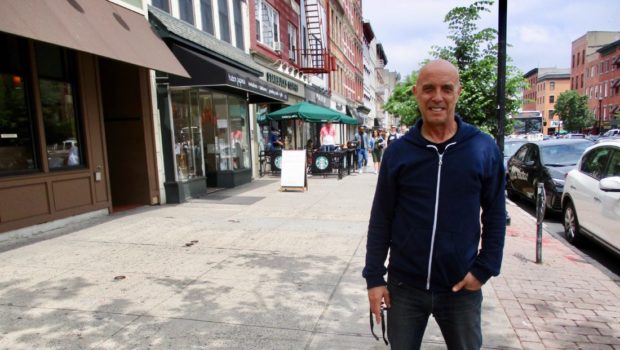
FREEDY RETURNS: Singer/songwriter Freedy Johnston found fame out of Hoboken in the 1990s—now he’s come back to his roots
by Jack Silbert
It was the late 1980s, and Kansas native Freedy Johnston was living in Queens, working in an architect’s office, recording song demos at home, and sending them out on cassette to whoever might listen. A reply came from Hoboken.
“Bar/None, the record label that They Might Be Giants were on, answered,” Johnston recalls to hMAG. “I signed with them because they were big fans of me.”
So in 1989, it made sense to him to move to the Mile Square City. Johnston explains, “The label I was going to record with was based here, and my manager Mark Zoltak lived here. He was a music fan and a realtor, so he became my manager but also got me my apartment!”
Johnston remembers a more raw Hoboken from that era, with a fenced-off waterfront, broken-down piers, and plenty of genuine characters. “My landlords were the brothers Facendola, and I’d go to the Facendola Fuel Company to pay my rent. They’d be sitting there, telling stories, surrounded by these open roll-top desks. They were all covered with slips of yellow paper, delivery slips, about three feet high,” Johnston says. “One brother would reach around to some random pile and pull out my rent slip. It was the most beautiful exhibition of pile-centric organization I’d ever seen.”
Still maintaining his day job, Johnston was living on Willow Avenue between 10th and 11th, playing open-mic nights, and starting to record his debut album. This was at the original location of Hoboken’s now legendary Water Music studio, in a former hat factory across from Leo’s Grandevous. Johnston compares that spot to the building where the studio eventually moved farther uptown.
“The new location was one of the biggest interior rooms in the city, where you could have a symphony orchestra,” Johnston states. (Everyone from Beyoncé to U2 to the Dave Matthews Band has recorded there.) “Now, where I recorded, the place kind of smelled like machine oil, and you’d always find hat pins in the really worn floorboards.”
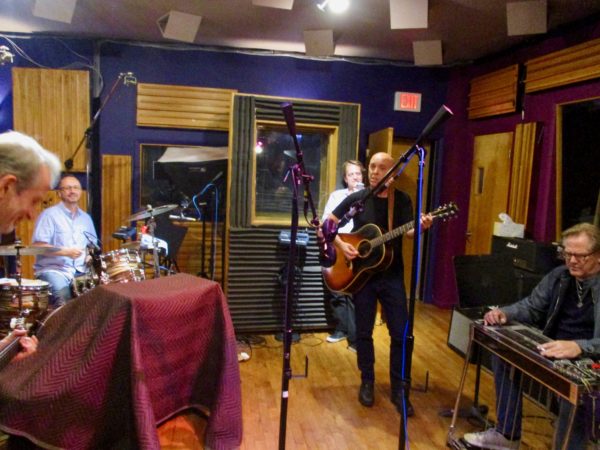
(left to right): Graham Maby, Brian Doherty, Freedy Johnston, and John Jorgenson in Kaleidoscope Sound, Union City
The resulting album, The Trouble Tree, was released by Bar/None in 1990. But Freedy Johnston’s breakthrough truly came with the follow-up album, Can You Fly, also recorded at Water Music and put out by Bar/None in 1992. Mark Zoltak is listed as “project coordinator” in that record’s liner notes (“executive producer” in the European version), but Johnston doesn’t feel it gives him proper due.
“Mark didn’t get enough credit from me for making that record what it was,” Johnston says. “He has a perfect belief in the music, as a pure force of life.”
The album was made over two separate recording sessions, not by creative choice but due to financial necessity. Johnston says, “We recorded one session and then ran out of money. That’s when I infamously sold my inherited farmland in Kansas. To the folks back home, I would’ve been the biggest fool, selling this prized land. I didn’t even tell my mom; she found out from an interview in Rolling Stone.”
With the fresh influx of cash, they were able to complete the album, and were very pleased with the finished product. “In a way it’s two different records, that hang together,” Johnston states. “The emotion of the record is real; I can’t deny that. We meant it.”
Can You Fly brought Johnston national acclaim that he wasn’t exactly prepared for. “I was really surprised. Wow. I went from being the dude who read about my friends — Matthew Sweet, the guys in Soul Asylum, the Replacements — to being in the magazine with them, overnight,” Johnston recalls. He also says that expectations of him changed dramatically: “They wanted me to go from the dude who was on the 126 bus every day to my job, to being an on-the-TV kind of guy. I got my teeth fixed!”
The album’s success led to Johnston getting signed by a major label, Elektra, and making his next album with Butch Vig, who’d also produced Nirvana’s Nevermind. This Perfect World, released in 1994, contained the single “Bad Reputation,” which spent 12 weeks on the Billboard charts. The record received glowing reviews, and the Rolling Stone critics’ poll voted Johnston songwriter of the year. Thinking back on the whole experience, Johnston says, “It was the luckiest moment of my life.”
Johnston is very excited with the upcoming reissue of This Perfect World, on vinyl for the first time. He says, “It was my biggest record, and my first record that didn’t come out on vinyl. I’m really glad we’re doing it, because there’s a sonic difference, a warmth. We found the original analog tapes and hired Scott Hull to remaster it. He worked on the original record, and he’s a legend. The record deserves to be on vinyl, and I’m glad it’s finally getting done.” You can pre-order a signed, numbered vinyl edition of This Perfect World (only 950 will be made) via Johnston’s Kickstarter campaign. (At the site, you can also contribute any amount to help support Freedy’s new recordings.)
With his Elektra record contract in hand, Johnston had moved away from Hoboken in 1993. But before leaving the area, he had something to take care of at Water Music before they relocated uptown. It concerned an old 1970s recording console that had never been turned off during the 12 years the original studio was in business. Johnston summoned assistance from two friends, noted engineer John Siket (Yo La Tengo, Sonic Youth) and guitarist James Mastro (The Bongos, Guitar Bar).
He explains, “I got the OK to go there the morning of the last day, and I wrote a song called ‘That’ll Never Make It To the Record,’ which is a phrase that John Siket would always use, meaning ‘We’ll edit it out.’ Mastro and I did rhythm guitar and drums. Then we did a round of bass and guitar, and then vocals. Next we unplugged the board — the power plug is this big thing that takes two hands to pull out of the wall. When you pull it out, it’s going take a long time for the sound to die. It took about 20 seconds, hearing “That’ll never make it to the record, that’ll never make it…,” the coolest decay in the world, getting more distorted….”
Freedy, who has the only cassette of the song somewhere at home, is proud to have made the very “last sounds” at the old Water Music: “I’m so glad I did it.”
Over the next 12 years, his career — including five additional studio albums, three on Elektra, one on Bar/None, and one on his own Singing Magnet label — and life in general moved Freedy to Woodstock, the East Village, WIlliamsburg, Nashville, Austin, and Madison, Wisconsin. But two years ago, an urge that was gnawing at him grew stronger. “I needed to get back to the city,” Johnston states. “I needed to get back to where I’m really from.”
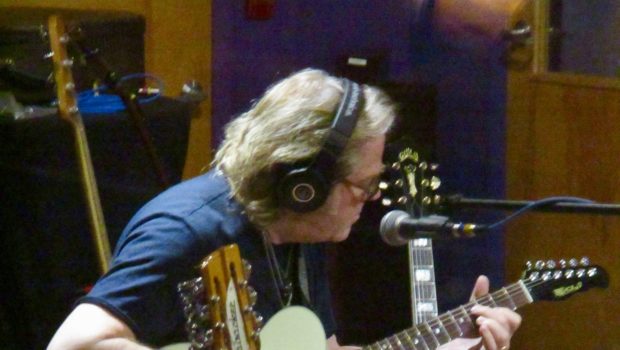
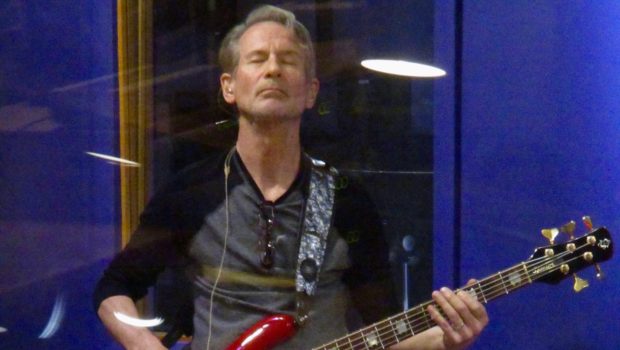
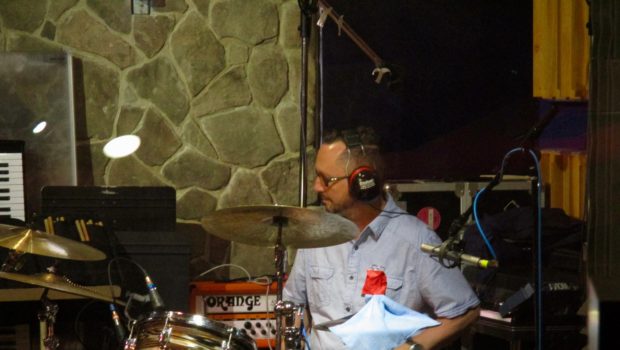
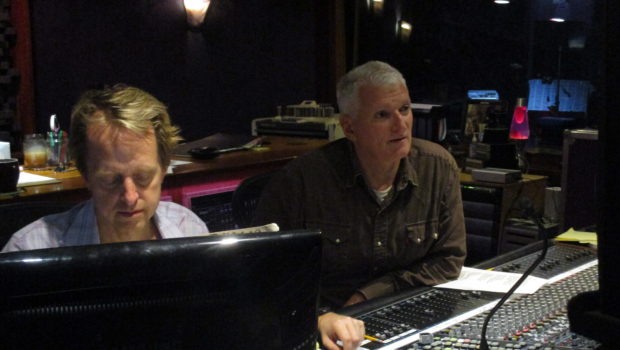
So he came back to Hudson County, to Jersey City Heights — “a place where, when I lived around here in the late 80s, was almost the same as it is now,” says Johnston. He reconnected with Mark Zoltak and, about a year ago, they began planning Freedy’s next album. The idea was to reunite much of the Can You Fly team, with Zoltak producing. Again, they’re splitting recording into two sessions, one now, and one in the fall. (With Water Music currently on hiatus, the first session is taking place at Kaleidoscope Sound in Union City.) Returning from Can You Fly for the first session are Graham Maby (Joe Jackson Band) on bass and Brian Doherty (They Might Be Giants) on drums. New to the crew is guitarist John Jorgenson, who has played with everyone from Bob Dylan to Bob Seger to Elton John. John Siket, who had worked on both Can You Fly and This Perfect World, is once again engineering.
Collaborating with friends from his Hoboken days has Freedy energized. “It’s the greatest feeling,” he says. “I really wanted everybody, since we know what to expect from each other. It feels like a real return.”
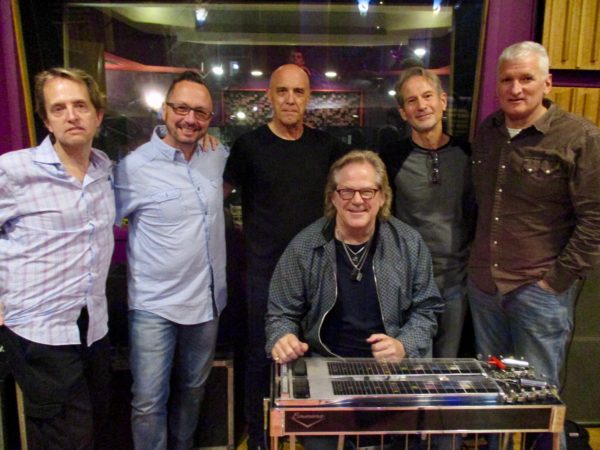
(left to right:) John Siket, Brian Doherty, Freedy Johnston, John Jorgenson, Graham Maby, and Mark Zoltak
***

 Previous Article
Previous Article Next Article
Next Article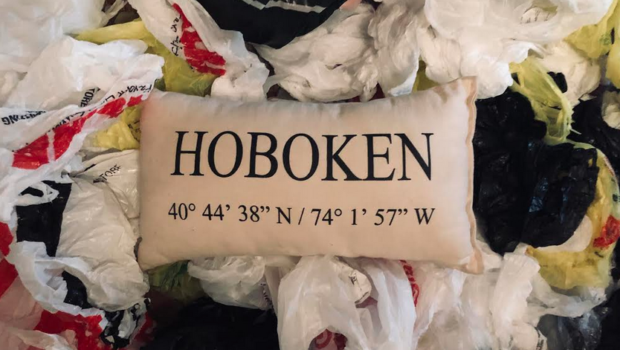 CARRY ON: Your Hoboken Plastic Bag Ban Survival Guide
CARRY ON: Your Hoboken Plastic Bag Ban Survival Guide 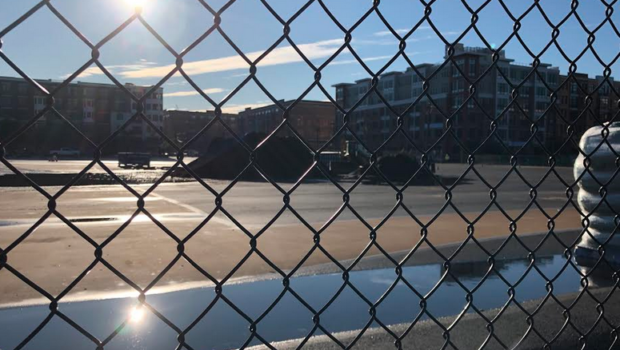 Hoboken Breaks Ground on Previously Encapsulated Industrial Site to Build Northwest Resiliency Park
Hoboken Breaks Ground on Previously Encapsulated Industrial Site to Build Northwest Resiliency Park 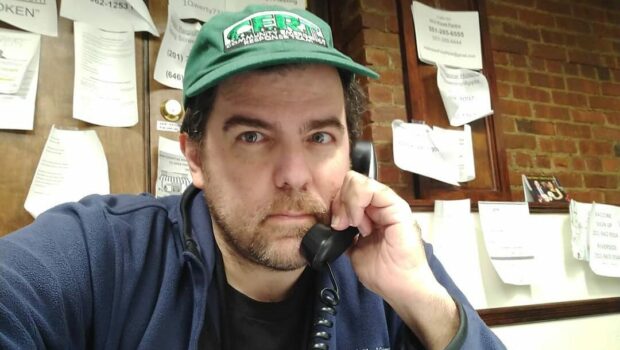 COVID HOTLINE, HOW CAN I HELP YOU?: My 14 Months Volunteering for Hoboken CERT in the City Hall Basement
COVID HOTLINE, HOW CAN I HELP YOU?: My 14 Months Volunteering for Hoboken CERT in the City Hall Basement  ADAM WADE — The Audacity of Authenticity
ADAM WADE — The Audacity of Authenticity 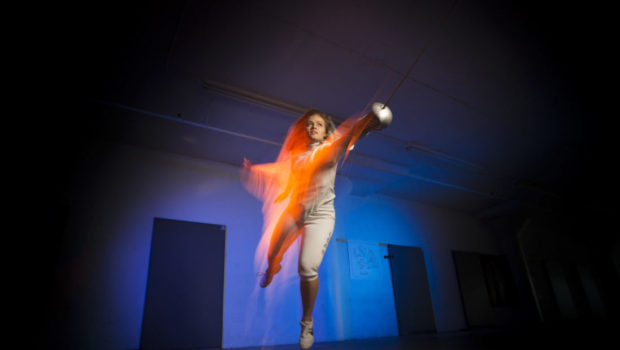 ATTACKING LIFE: U.S. Olympic Fencer Dagmara Wozniak Brings Grace to Combat Sport
ATTACKING LIFE: U.S. Olympic Fencer Dagmara Wozniak Brings Grace to Combat Sport  RAIN FALLS, HOBOKEN FLOODS: Mayor Defends Flood Mitigation Efforts in Wake of Fay; Labels Sewer Replacement ‘Impractical’
RAIN FALLS, HOBOKEN FLOODS: Mayor Defends Flood Mitigation Efforts in Wake of Fay; Labels Sewer Replacement ‘Impractical’ 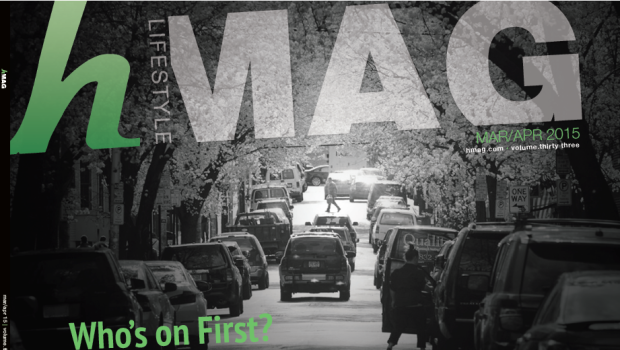 “A Nation of Shopkeepers” — the Latest Issue of hMAG
“A Nation of Shopkeepers” — the Latest Issue of hMAG  “The Hoboken Chicken Emergency”… and other Pinkwater Tales
“The Hoboken Chicken Emergency”… and other Pinkwater Tales